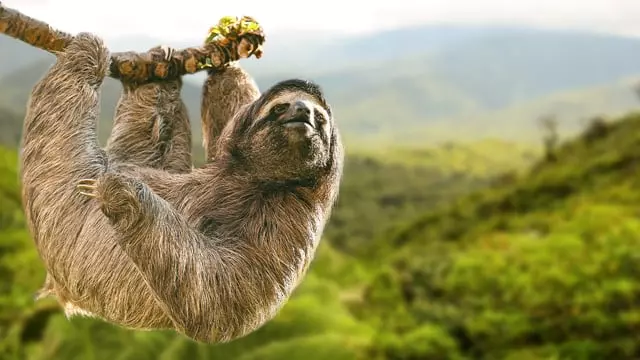
Sloths
Volunteer With Sloths
Delve into the jungles of Central and South America and change the uncertain future facing one of the world's quirkiest tree-dwelling animals, the sloth. Having gained popularity over the years, partly due to David Attenborough's beloved documentaries and pronunciation of their name, and because of their relaxed nature and often comical facial expressions, sloths have captured the hearts of us all.
Yet, sloth conservation is becoming more and more necessary with habitat loss and fragmentation, alongside poaching to fuel exploitative sloth tourism, slowly dwindling their numbers away. With other jungle wildlife facing similar threats, The Great Projects offers the opportunity to volunteer with sloths in multi-species sanctuaries or the wild in Costa Rica and Peru. From feeding, creating enrichment and enclosure cleaning to planting trees and monitoring sloths in pre-and-post-release phases, you can change the course of rescued sloths' lives and support them in their return to the wild - where they belong.
Volunteer with sloths and help safeguard a multitude of wildlife species in some of the world's most renowned rainforests!

Projects Do More
7 - 84 Nights from $804.00
Volunteer with some incredible wildlife in the stunning tropical rainforests of Costa Rica!
View project6 - 83 Nights from $804.00
Volunteer and contribute to wildlife conservation efforts in verdant Costa Rica!
View project7-84 Nights from $669.00
Have a lasting impact on wildlife conservation efforts in the Amazon Rainforest and help protect some of Peru's most fascinating species!
View projectOn the Blog
Sloth Information
Sloths At A Glance
Endangered Status
Dependent On Species
Number remaining in the wild
Unknown
Endemic Region
The Americas
There are two types of sloths, two-toed and three-toed, and six species. The pygmy three-toed sloth is critically endangered, another species is considered vulnerable, and the other four species of sloth are categorised as least concern on the IUCN Red List:
Two-toed sloths:
- Linnaeus’s two-toed sloth – least concern
- Hoffman’s two-toed sloth – least concern
Three-toed sloths:
- Pygmy three-toed sloth – critically endangered
- Pale-throated Three-toed sloth – least concern
- Maned Three-toed Sloth - vulnerable
- Brown-throated Sloth – least concern
While only one species is technically endangered, rapid reduction and fragmentation of their habitat and the illegal wildlife trade puts increasing pressure on all sloth species.
Sloths face several significant threats that jeopardise their survival and put all species at risk, including:
- Habitat Loss: Deforestation and habitat destruction are the most critical threats to sloths. As forests are cleared for agriculture, urban development, and logging, sloths lose their natural habitats, leading to population declines.
- Road Accidents & Electrocution: The fragmentation of their habitat as human infrastructure expands has led to countless sloths being hit by vehicles when attempting to cross roads and electrocuted when mistaking powerlines for branches and vines.
- Illegal Wildlife Trade: Sadly, the rise in their popularity has seen a steep incline of sloths captured and sold as pets or for use in the tourism industry. More and more people started to visit unethical 'sanctuaries' and parks to take 'sloth selfies', which incentivised rampant poaching.
- Climate Change: Changes in climate patterns can affect food availability and suitable habitats for sloths. Shifts in temperature and precipitation can alter the ecosystems sloths depend on, making it harder for them to survive.
- Predation: Sloths have some natural predators, such as jaguars and harpy eagles, and sadly, human-induced changes can increase their vulnerability. For instance, habitat fragmentation can make sloths more accessible to predators.
- Diseases: Emerging diseases, possibly exacerbated by climate change and habitat disturbance, can affect sloth populations. Diseases can spread more easily now they live in a reduced range.
- Pollution: Pollution, including pesticide use and plastic waste, can harm sloths. Chemical pollutants can contaminate their food sources, and plastic debris can cause injuries or entanglement.
You can see sloths in their native rainforest homes in South America, including Bolivia, Brazil, Colombia, Ecuador, Peru, Honduras and Venezuela, as well as in Central America, including Costa Rica and Panama.
As Costa Rica's national animal, Costa Rica has become a popular destination to see and volunteer with sloths. With The Great Projects, you can work with sloths in wildlife sanctuaries and the wild in Costa Rica and Peru.
The Great Projects offers exciting projects where you'll see and work with sloths daily, along with a multitude of other cute and fascinating species.
You can volunteer with sloths in Costa Rica on a sanctuary-based project such as the Sloth Conservation & Wildlife Experience or the Costa Rica Wildlife Sanctuary. Alternatively, you can join Wildlife Rehabilitation & Release in Costa Rica, where you may have the opportunity to see sloths in the later stages of their rehabilitation journey or post-release - you may even witness a sloth release!
While there are places where you can go to hold sloths in 'sanctuaries', zoos, and parks, this practice is harmful to sloth conservation, and we strongly advise against participating in it.
These encounters often cause a great deal of stress to sloths, which are solitary animals. Places offering these encounters may have physically taken the animals from the wild, or if they were rescued, these interactions may negatively affect the chances of the sloth being able to be released back into the wild.
The Great Projects is proud to collaborate with ethical sanctuaries and research projects that prioritise the well-being of sloths and other wildlife. These organisations work towards releasing sloths back into their natural habitat or providing them with the most natural lives possible if release is sadly unachievable.







